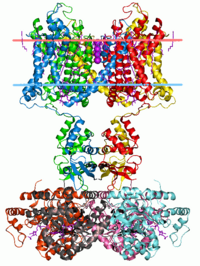
Photo from wikipedia
Introduction: Voltage-gated Kv7/M potassium channels play an essential role in the control of membrane potential and neuronal excitability. Fangchinoline, a bisbenzylisoquinoline alkaloid, displays extensive biological activities including antitumor, anti-inflammatory, and… Click to show full abstract
Introduction: Voltage-gated Kv7/M potassium channels play an essential role in the control of membrane potential and neuronal excitability. Fangchinoline, a bisbenzylisoquinoline alkaloid, displays extensive biological activities including antitumor, anti-inflammatory, and antihypertension effects. In this study, we investigated the effects of fangchinoline on Kv7/M channels. Methods: A perforated whole-cell patch technique was used to record Kv7 currents from HEK293 cells and M-type currents from mouse dorsal root ganglion (DRG) neurons. Results: Fangchinoline inhibited Kv7.2/Kv7.3 currents in a concentration-dependent manner, with an IC50 of 9.5 ± 1.2 μM. Fangchinoline significantly inhibited Kv7.1, Kv7.2, Kv7.3, Kv7.4, and Kv7.3/Kv7.5 channels without selective effects. Furthermore, fangchinoline significantly slowed the activation of Kv7.1-Kv7.5 channels and inhibited native M-channel currents of DRG neurons. Conclusion: Taken together, our findings indicate that fangchinoline concentration-dependently inhibited Kv7/M channel currents.
Journal Title: Pharmacology
Year Published: 2022
Link to full text (if available)
Share on Social Media: Sign Up to like & get
recommendations!